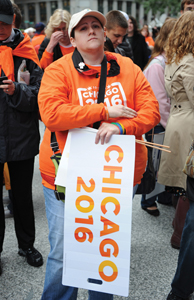Oct. 2, 2009, is a day that will last in my memory for a long time.
It had been almost four years earlier when an initial group of six of us had met consistently in the Chicago McKinsey office to determine whether Chicago was a viable candidate to host the 2016 Olympic Games.
The journey had taken us from that small office (with the internal windows covered so no one could see what we were doing), to California to pitch the U.S. Olympic Committee initially, to a shootout with Los Angeles in Washington, D.C., for the right to be the U.S. candidate city.
Now, sitting in Copenhagen, representatives from all walks of Chicago life waited to see if indeed our journey would be rewarded.
With one brief statement at 4:25 p.m. from International Olympic Committee President Jacques Rogge, it was declared that not only had we not won, but we had come in last, being eliminated first amongst all of the candidate cities (Rio, Madrid and Tokyo).
Now, five years later it looks like another U.S. city is about to pick up the mantle. At the most recent board meeting the USOC met to determine if they want to bid, and which four cities will continue to discuss being the U.S. candidate city moving forward to the international competition in 2017, when the 2024 host city will be selected.
 |
|
The USOC has made key changes since Chicago’s defeat.
Photo by: GETTY IMAGES
|
Is there any reason to believe that the U.S. bid this time will do better than New York (last in the competition for 2012) and Chicago (last in the decision for 2016)? So poor had been the U.S. bid efforts that the USOC decided to not even put forward a city for 2020. Why the change of heart now?
Since the humiliation of the 2016 loss (a phrase it has taken me several years to be able to say out loud), the USOC has taken to task a systematic approach to determine what can, and should, be done to merit another run at this global competition.
The approach focused on three key areas:
1. Leadership: President Scott Blackmun and Chairman Larry Probst have made a long-term commitment to make the USOC a better and stronger partner within the Olympic family.
2. Revenue: Between a renegotiation of the contentious revenue-sharing agreement (how monies generated by the Olympic movement are distributed) and the recent long-term agreement by NBC (U.S. broadcast partner for $7.65 billion through 2032), the USOC is now well-positioned as a strong contributor to the long-term viability of the Olympic brand.
3. Partnership: Members of the USOC, U.S. sports and others with expertise in specific areas (such as Scott McCune, who ran Olympic marketing at Coca-Cola) are now fully engaged in IOC working groups helping determine how to develop and execute best practices across several key areas.
None of this means a U.S. bid will win, but it leads one to believe that the playing field is now level and that a U.S. city is well-positioned to make a run at the role of host city.
There will certainly be a backlash and a hesitation in each market around a U.S. bid, and it will undoubtedly focus on the potential financial burden. This is understandable as we now see the deserted and decayed venues in markets such as Athens and Beijing. Couple that with the ridiculous numbers being thrown around for the overall cost of Games such as Sochi (if they stated $51 billion, you can be fairly certain it was more). Surely this is a case for buyer beware?
However, a longer-term view of the real costs and benefits of hosting may well be warranted. It was not until Los Angeles (1984) actually turned a significant profit ($233 million) that cities determined there may be financial benefit to hosting the Games. In 1992, Barcelona took its investment to a new level by changing the overall landscape of its harbor and going from a city of relative obscurity to the 12th most popular city in the world. This led to increased tourism, business development, and the unintended consequence of an investment in sports infrastructure that resulted in the development of a successful and profitable Spanish sports market.
More recently a report just released states that Homebush Bay (the Olympic Park for Sydney during the 2000 Games) is now generating $5.2 billion in annual revenue, making it the 20th biggest local economy in Australia. London is certainly hoping to replicate this model with the creation of Queen Elizabeth Park and the legacy of one of the largest urban shopping centers in Europe, all in the previously blighted area around Stratford.
With this mixed set of results, are the Games a boom or bust for host cities? It depends. One advantage that U.S. cities have is a sizable existing transportation system and a significant investment already in sports facilities. All four of the cities focused on 2024 hold a strong cost advantage over places such as Beijing, which basically started from scratch. However, it will still be critical to develop a long-term legacy that will ensure that any incremental costs taken on by the host city can be justified as either a needed enhancement for the city or region, or one that leads to future measurable, justifiable revenue streams.
So, many U.S. cities have contemplated the opportunity to host the world. Some have actually had the chance. A U.S. candidate city for 2024, if selected, is in for a ride unlike anything else it has ever encountered. And there is no guarantee that the story ends well. But, done correctly, it can be a catalyst for future growth. I believe the time is right for a U.S. city to bid, and fortune favors the bold.
Gordon Kane (victorysm@comcast.net) is an Olympic marketing consultant who works with Olympic sponsors and bid cities.





